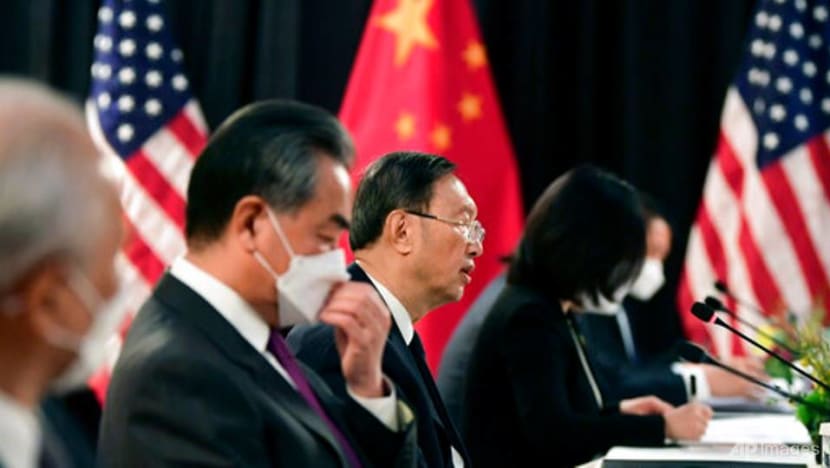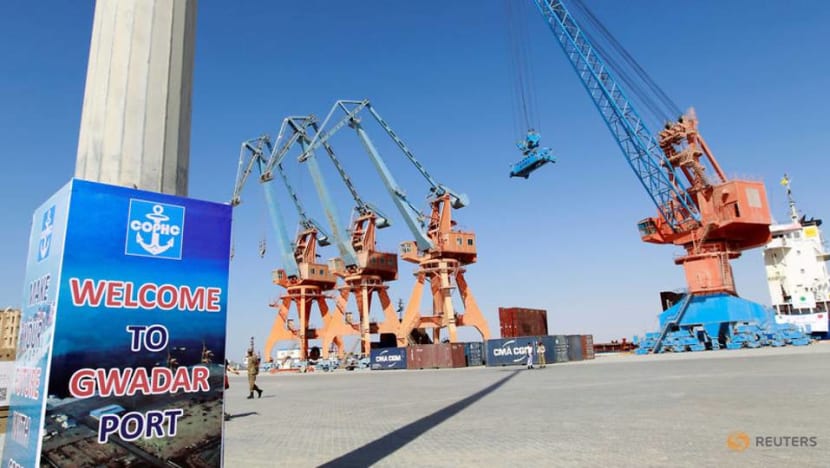Commentary: US withdrawal from Afghanistan spells end of China’s free ride on international security
The exit of US troops is inconvenient news for a China growing its commercial and strategic interests overseas, says Christian Le Miere.

Chinese Communist Party foreign affairs chief Yang Jiechi and China's State Councilor Wang Yi speak at the opening session of US-China talks at the Captain Cook Hotel in Anchorage, Alaska on Thursday, Mar 18, 2021. (Photo: AP/Frederic J Brown)
HONG KONG: With the fall of Kabul to the Taliban, the US in the 21st century has replicated the ignominious exits by the UK in the 19th century and the Soviets in the 20th.
That exodus has been accompanied in its chaos by images – like that of a US C-17 transport aircraft taking off while desperate Afghans attempt to cling to the fuselage – that will live on in the memory of a concerned international community.
In Beijing, the sight of the US departing from Afghanistan will likely create mixed feelings.
On the one hand, pictures of US troops leaving in disorder reinforces the narrative of nationalists in Beijing who see a strategic rival being humbled with its resolve to intervene overseas repudiated.
The removal of several thousand US troops from China’s western border is also a fillip, creating strategic space for Beijing and removing an obstacle to the further development of Beijing’s influence in Central Asia.
WHY US WITHDRAWAL FROM AFGHANISTAN CONCERNS CHINA
But the US withdrawal is not all good news for the Chinese government for two reasons.
First, the US withdrawal is part of a wider strategic shift in Washington, attempting to end costly campaigns in the Middle East and Afghanistan so that military and geopolitical attention can be focused more intently on the Indo-Pacific, as vice-president Kamala Harris hinted while in Singapore this week, and China more specifically.
In essence, the US is bringing to an end land campaigns in Asia to better concentrate on the maritime domain in the Western Pacific.
This continues a long strategic tradition encapsulated in the 1890s by influential American strategic thinker, Alfred Thayer Mahan, who highlighted the importance of sea power for the dominance of nations.
Second, the US withdrawal highlights an uncomfortable new reality for Beijing. For the last 40 years of its remarkable economic development, it has been able to free ride on the US global security presence.
Washington has guaranteed global public goods, such as the freedom of navigation and maritime commerce, while also launching overseas interventions to combat the rise of extremist militant groups, all of which are in China’s strategic interest.
Beijing, meanwhile, has had to expend no blood or treasure to benefit from these interventions, and could focus domestically on rapidly developing its economy, military and social cohesion, with only brief and limited international security operations.
Since China’s opening up began in 1979, the year the country last fought a significant conflict with a foreign power, China has only been involved in conflict on a handful of occasions – brief border clashes with India in 1987 and 2020, and a one-day skirmish over the Spratly Islands with Vietnam in 1988.
END OF A FREE RIDE
Now, that free ride appears to be coming to an end. The US is withdrawing from Middle East theatres in Afghanistan and Iraq just as China is growing its commercial presence and interests overseas.
Through the Belt and Road Initiative (BRI), Beijing has invested hundreds of billions of dollars in overseas projects to further trade goals, with many investments in some of the world’s poorest and most troubled regions.
Pakistan is a case in point. The China-Pakistan Economic Corridor, the most advanced and largest leg of the BRI that has secured US$65 billion in pledged funding, is already a security headache for China.
A suicide bombing in mid-July killed nine Chinese citizens working on the Dasu dam, part of CPEC. Another suicide bombing last Friday (Aug 20) at the Gwadar East Bay Expressway, another key CPEC project, injured a Chinese national.

US SECURITY UMBRELLA CRITICAL FOR CHINA’S OIL TRADE
The shift to the Western Pacific is leading to a drawdown of US forces elsewhere in the world, particularly the Middle East.
In June, US defence secretary Lloyd Austin told Saudi crown prince Mohammed bin Salman that the US would accelerate the withdrawal of eight Patriot and one Terminal High-Altitude Area Defence missile defence batteries and some jet fighters from the region.
China has been a net oil importer since 1993. In 2020, five of the top 10 suppliers of oil to China were Gulf states. Securing this vital source of energy is now one of China’s key strategic goals, as well as ensuring stability in the oil markets more broadly.
As a result, Beijing has steadily been enhancing its security presence in Central Asia and the Middle East. The country’s first overseas military base was inaugurated in Djibouti in 2017, and has since been expanded with an aircraft carrier pier added in April.
Washington expects more bases will follow. The 2020 US Department of Defense annual report on China’s military development cited 12 countries in the Middle East, Southeast Asia, Central Asia and Africa as places the People’s Liberation Army is “very likely already considering and planning for additional overseas military logistics facilities”.
CHINA WANTS TO PRESERVE ‘PEACEFUL RISE’ NARRATIVE
This is not to say that China is ready to take on a role as global policeman. Beijing remains clear-eyed about the problem with direct foreign intervention not to mention the risk of over-extension.
After all, the Chinese Communist Party has for years painstakingly attempted to craft a narrative of China’s peaceful rise, contrasting it with the conflict-laden past few decades of US foreign policy.
Beijing’s strategic priorities also remain focused on its maritime near-abroad, over Taiwan, the South China Sea and the East China Sea.
And so China is unlikely to make the same mistakes on military interventions in Afghanistan as did the British, Soviets and Americans.
Nevertheless, the US withdrawal from Kabul, as well as Baghdad, and drawdowns elsewhere is creating a very different strategic picture when viewed from Beijing.
With growing overseas interests and unstable, ungoverned areas near China’s western frontier, the calculations for Chinese security interventions may be shifting.
And for the first time in modern history, with rapidly developing power projection capabilities, China is in a position to be able to export security beyond its borders.
The last time China went to war was in 1979, with Vietnam, just four years after the fall of Saigon and the US’ equally dramatic withdrawal.
Then, instability on China’s border with the rise of the Khmer Rouge in Cambodia and Vietnam’s invasion of its neighbour inspired an operation to punish Hanoi.
It is yet to be seen if the US withdrawal from Afghanistan will be followed by similar Chinese adventurism. The country’s economic interests there are few, save for a concession on a US$4 billion copper mine in Mes Aynak, the world’s second largest, that has been stalled for a decade.
And while Beijing is very keen to ensure Afghanistan under the Taliban does not become a training ground for extremists or, more importantly, Uyghur separatist militants, it has proactively engaged diplomatically with the Taliban to gain assurances of that very fact.
Still, it is now clear for Beijing that in Afghanistan, as elsewhere in the world, it must increasingly shoulder this security burden itself. Its free ride is over.
Christian Le Miere is a foreign policy adviser and the founder and managing director of Arcipel, a strategic advisory firm based in London.





















